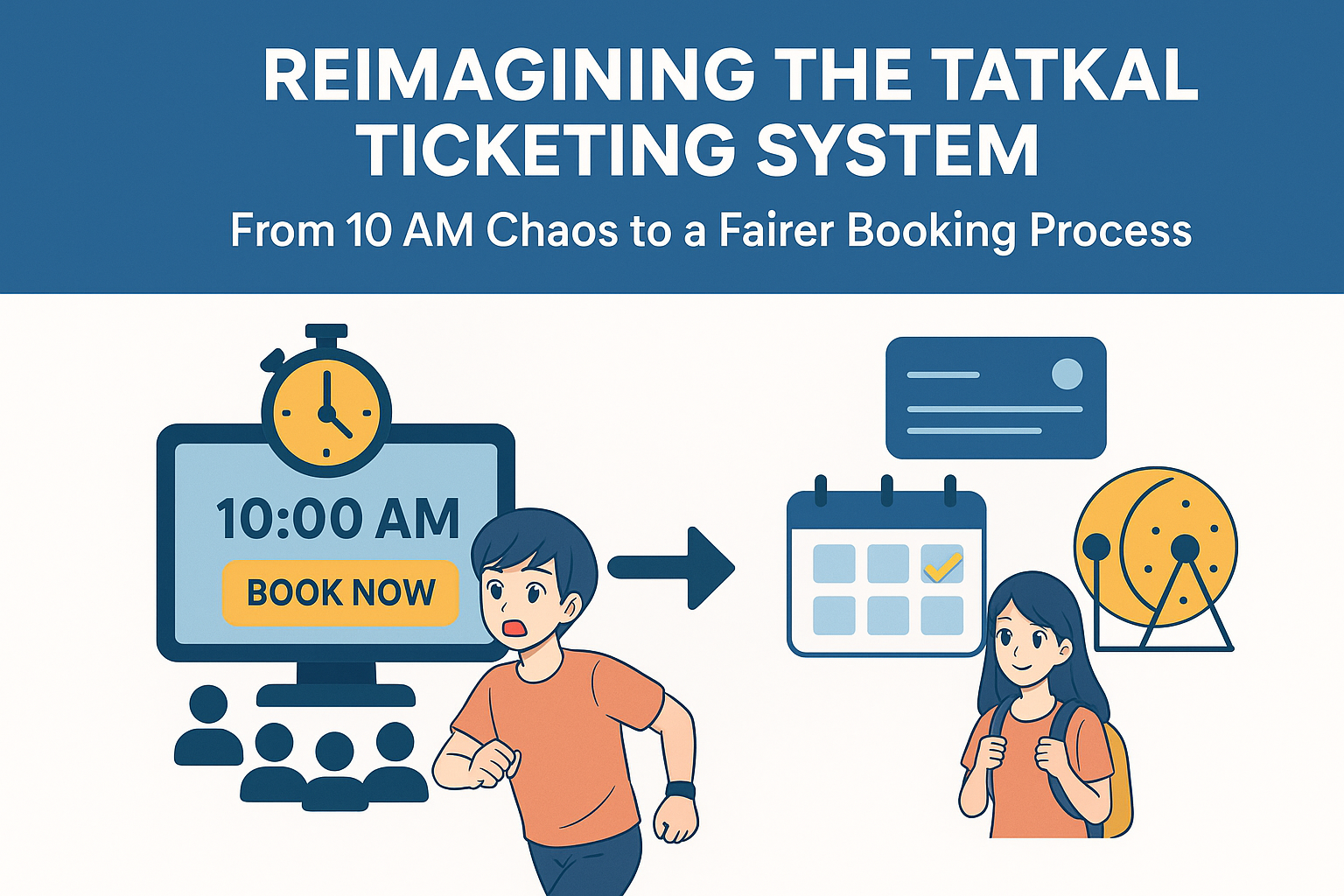Reimagining the Tatkal Ticketing System: From 10 AM Chaos to a Fairer Booking Process
Last month, I tried booking a Tatkal ticket from Indore to Mumbai. If you’ve booked a Tatkal ticket on IRCTC, you know the routine: set an alarm, log in early, keep details ready, hover over “Book Now” at 9:59:58… and hope you’re faster than a few lakh other passengers, travel agents, and automated booking tools. As a QA engineer, I could not help thinking — this isn’t a train booking, it’s a digital stampede.»»
Tatkal’s Purpose vs. Today’s Reality
Tatkal was introduced to help passengers who have urgent or last-minute travel needs.
In spirit, it’s a lifeline for emergencies: sudden work trips, family events, or medical needs.

But in practice, it works on a first-come, first-served basis at a fixed time:
- AC Tatkal opens at 10:00 AM, Sleeper Tatkal at 11:00 AM, exactly one day before the journey.
- Only a small quota (~10–30% of seats per class) is released.
- All booking channels — website, app, agents, and station counters — hit the same pool simultaneously.
The result? Whoever is fastest — with the best internet speed, lowest latency, automated tools, and perfect timing — gets the advantage, not necessarily the person with the most urgent need.
The Problems with the Current “Fastest Finger First” Model
Urgency cannot be compared. A tech-savvy person’s emergency is no more important than that of someone less comfortable with technology.
Yet today’s system rewards speed over genuine need.
Major issues:
- Wasted Time – Lakhs of people spend around 20 minutes trying to book Tatkal daily. That’s millions of man-hours wasted every year.
- Server Overload – Thousands of concurrent logins cause lags, session drops, and failed payments.
- Speed Bias – People with high-speed internet and autofill tools get an unfair advantage.
- Passenger Stress – A few seconds’ delay in CAPTCHA or payment means losing the ticket.
- Opaque Seat Vanishing – Tickets disappear in seconds, raising doubts about fairness.
For urgent travel, this system often creates more stress than support.
A Better Way: The Lottery-Based Tatkal Booking
Instead of rewarding the fastest click, Tatkal could work more like a fair draw.
How It Could Work
- Application Window – Passengers can apply for Tatkal tickets anytime within 48 hours before departure (cut-off 24 hours before train leaves).
The booking form would allow:- Payment in advance
- Priority berth preferences
- Option to book only if confirmed berth is allotted
- Option to book only if all passengers in a booking get a seat
- Randomized Allotment – When the window closes, the system will consider every booking as one data-set and randomly pick data set and assign available Tatkal seats, starting from confirmed tickets, then moving to the waiting list.
- Confirmation & Payment Window – Selected passengers get a fixed short window (e.g., 15 minutes) to confirm if payment wasn’t made in advance.
Advantages
- Fairness – Equal chance for all, regardless of internet speed, since all urgency is treated equally.
- Lower Server Spikes – Demand spread over hours, not concentrated in a few seconds.
- Reduced Agent Dominance – Bots and scripts can’t click faster to win.
- Less Stress – Passengers can apply calmly without racing the clock.
What IRCTC Gains
- Improved System Stability – Lower risk of peak-time crashes.
- Better Public Trust – Transparency in how seats are allocated.
- Future-Proofing – Scales better as demand grows.
Potential Concerns & Fixes
- “I need instant confirmation” → Announce results at a fixed time (e.g., 3:00 PM) so passengers know exactly when to check.
- Fear of manipulation → Use auditable, transparent randomization algorithms for seat allocation.
Conclusion
Tatkal was meant for urgency — but the current first-come, first-served race favors speed over need.
A lottery-based booking could restore fairness, reduce chaos, and make the process work as originally intended: helping those who genuinely need to travel on short notice.
Because at the end of the day, your chance to attend a family function or reach a hospital shouldn’t depend on whether you can click “Pay” a fraction of a second faster.